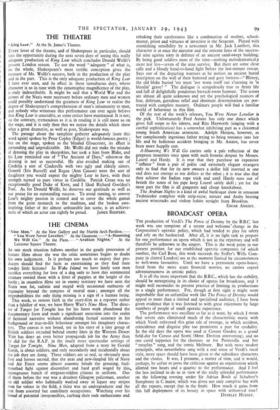THE CINEMA
Nine Men." At the New Gallery and the Marble Arch Pavilion.- " You Were Never Lovelier." At the Gaumont.—"A-Haunting We Will Go." At the Plaza. " Arabian Nights." At the Leicester Square Theatre.
As orie stock situation follows another in the gaudy procession of feature films about the war the critic sometimes begins to doubt his own judgement. Is it perhaps too much to expect that pro- ducers should find the facts as entertaining as they find their tawdry little fictions? In Wake Island we have lately seen men sacrifice everything for love of a dog only to have this sentimental creature reward them with a litter of puppies at the height of the battle ; in countless films set in enemy territory we have seen the Nazis wax fat, sadistic and stupid with occasional outbursts of ingenuity beyond the compass of mortal man ; amongst all the improbabilities the only thing missing is a sign of a human being.
This week, to restore faith in the story-film as a reporter rather than a falsifier of war, we have Harry Watt's Nine Men. The direc- tor of Target for Tonight has for his latest work abandoned the documentary form and made a significant excursion into the realm of fictional narrative without abandoning factual accuracy in his background or true-to-life behaviour amongst his imaginary charac- ters. The canvas is not broad, yet in his story of a tiny group of British soldiers stranded behind enemy lines in the Western Desert Watt has done an even better propaganda job for the Army than he did for the R.A.F. in the much more spectacular settings of Target for Tonight. Nine Men, adapted from a story by Gerald Kersh, is about soldiers, and only secondarily and incidentally about the job they are doing. These soldiers are so real, so obviously men first and heroes second, that the neat and new-(angled life of Navy and Air Force seems almost anaemic beside the grousing, foul- mouthed fight against discomfort and hard graft waged by this Incongruous bunch of sergeant-ridden citizens in uniform. One of them before the war was a drunken Glasgow policeman, another an old soldier who habitually washed away in liquor any stripes won for valour in the field, a third was an undergraduate and the rest from assorted but unmilirafy occupations. Watching over his brood of potential irresponsibles, curbing their rash enthusiasms and
rebuking their carelessness like a combination of mother, school- master, priest and virtuoso of invective is the Sergeant. Played with astonishing sensibility by a newcomer in Mr. Jack Lambert, this character is at once the narrator and the reticent hero of the success- ful nine against sixty in defence of an ancient sand-swept building. By being good soldiers most of the time—nothing melodramatically more nor less—seven of the nine survive. But there are some close calls and a bloody hand-to-hand fight before the last-minute rescue. Says one of the departing warriors as he notices an ancient burial inscription on the wall of their battered and gory fortress—" Blimey, the old bloke buried 'ere must 'ave worn isself out a'turning in 'is bleedin' grave! " The dialogue is scrupulously true to Army life and full of delightfully ponderous barrack-room humour. The actors are almost all quite unknown and yet the psychological nuances of fear, delirium, garrulous relief and obstinate determination are por- trayed with complete mastery. Ordinary people will find a familiar world of behaviour in this film.
Of the rest of the week's releases, You Were Never Lovelier is the pick. Unfortunately Fred Astaire has only one dance which gives full scope to his talents, and Rita Hayworth (singing with a careful sophistication) has a somewhat inhibiting part as a cloistered young South American aristocrat. Adolph Menjou, however, as her complacently ingenious father trying to bring romance into her life and by ludicrous accident bringing in Mr. Astaire, has never been more happily cast.
A-Haunting We Will Go carries only a pale reflection of the gorgeous insanities once spun with such frenetic despair by Messrs. Laurel and Hardy. It is true that they purchase an expensive " inflator " from a pair of polite and extremely elegant strangers only to find that for its new owners a dollar bill inserted at one end does not emerge as ten dollars at the other ' - it is true also that they achieve the Indian rope trick and until Hardy runs out of breath the notes of his pipe keep Laurel safely aloft • yet for the most part the film is all gangsters and cheap knockabout. The Arabian Nights is a kind of awful burlesque show in sensuous Technicolor complete with strip-tease, torture and Arabs bearing ancient wisecracks and violent habits straight from Brooklyn.
EDGAR ANSTEY.


























 Previous page
Previous page